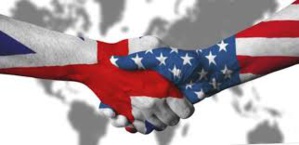A U.S. farming union believes that the UK/US free trade deal should include hormone-injected beef and chlorine-washed chicken.
US food was "perfectly safe" and there had been a lot of "fear-mongering", said Roger Johnson, president of America's National Farmers Union.
More than 200,000 US farms are represented by this politically-influential union.
UK farmers would also be boosted as the huge US market to British farm products by a free trade deal, said Johnson to a British TV news channel.
Both the U.S. and U.K. governments have stressed that they want ot sign a free trade agreement after the completion of Brexit and a central part of any such agreement would comprise of agricultural products.
The British National Farmers Union has already strongly expressed it opposition to the opening up of the British market to US food products and therefore any form of deal between the two countries would not be devoid of controversies.
While the European Union has prohibited many US products, U.K. has criticized the food standards followed in the U.S. the products under the scanner include chicken which is regularly cleaned with chlorine for reducing and removing bacteria and beef that is also routinely injected with growth stimulating hormones. The list also includes pork that has the drug ractopamine injected into for the fast building of muscle mass in pigs.
There are also differences in opinion between the EU and the US on genetic modification where the U.S. freely allows that to happen in many crops which are also exported.
The EU bans on American food "unnecessarily restrict trade" and those were not formulated on "scientific principles", says the United States Trade Representative, which draws up policy recommendations for the President.
Completion of Brexit and the U.K. also planning to move out of the single customs regimen of the EU would allow the UK to ink down free trade agreements with other countries including the U.S.
"I would not argue that it is a lower standard, I would argue it's a different standard," Johnson said referring to the different scientific approaches adopted by both sides.
America was more "risk-tolerant", he said
"I think it is fair to say that the standards that we follow allow for more rapid scientific advancement, that a more cautionary approach [from the EU] means that scientific advances are going to happen more slowly.
"The trade negotiations need to figure out a way to allow both of these standards to be used and in a way that is honest and truthful - and let consumers choose," he added.
(Source:www.bbc.com)
US food was "perfectly safe" and there had been a lot of "fear-mongering", said Roger Johnson, president of America's National Farmers Union.
More than 200,000 US farms are represented by this politically-influential union.
UK farmers would also be boosted as the huge US market to British farm products by a free trade deal, said Johnson to a British TV news channel.
Both the U.S. and U.K. governments have stressed that they want ot sign a free trade agreement after the completion of Brexit and a central part of any such agreement would comprise of agricultural products.
The British National Farmers Union has already strongly expressed it opposition to the opening up of the British market to US food products and therefore any form of deal between the two countries would not be devoid of controversies.
While the European Union has prohibited many US products, U.K. has criticized the food standards followed in the U.S. the products under the scanner include chicken which is regularly cleaned with chlorine for reducing and removing bacteria and beef that is also routinely injected with growth stimulating hormones. The list also includes pork that has the drug ractopamine injected into for the fast building of muscle mass in pigs.
There are also differences in opinion between the EU and the US on genetic modification where the U.S. freely allows that to happen in many crops which are also exported.
The EU bans on American food "unnecessarily restrict trade" and those were not formulated on "scientific principles", says the United States Trade Representative, which draws up policy recommendations for the President.
Completion of Brexit and the U.K. also planning to move out of the single customs regimen of the EU would allow the UK to ink down free trade agreements with other countries including the U.S.
"I would not argue that it is a lower standard, I would argue it's a different standard," Johnson said referring to the different scientific approaches adopted by both sides.
America was more "risk-tolerant", he said
"I think it is fair to say that the standards that we follow allow for more rapid scientific advancement, that a more cautionary approach [from the EU] means that scientific advances are going to happen more slowly.
"The trade negotiations need to figure out a way to allow both of these standards to be used and in a way that is honest and truthful - and let consumers choose," he added.
(Source:www.bbc.com)






